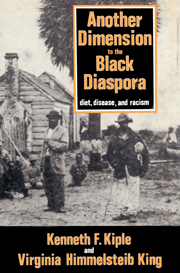Book contents
- Frontmatter
- Contents
- Preface
- Acknowledgments
- Part I African beginnings
- Part II Immunities: epidemiology and the slave trade
- Part III Susceptibilitie
- Part IV Antebellum medicine
- Introduction to Part IV
- 11 Slave medicine
- 12 Physicians versus the slaves
- Part V Sequelae and legacy
- Notes
- Bibliographic essay
- Index
11 - Slave medicine
Published online by Cambridge University Press: 26 March 2010
- Frontmatter
- Contents
- Preface
- Acknowledgments
- Part I African beginnings
- Part II Immunities: epidemiology and the slave trade
- Part III Susceptibilitie
- Part IV Antebellum medicine
- Introduction to Part IV
- 11 Slave medicine
- 12 Physicians versus the slaves
- Part V Sequelae and legacy
- Notes
- Bibliographic essay
- Index
Summary
The most profitable kind of practice is that among negroes.
Samuel Cartwright (1853)Ole Miss, she generally looked after the niggers when they sick and give them the medicine. And, too, she would get the doctor iffen she think they real bad off cause like I said, Ole Miss, she mighty stingy, and she never want to los no nigger by them dying. Howsomever, it was hard to get her to believe you sick when you tell her that you was, and she would think you just playing off from work.
Tines Kendrick, Georgia ex-slaveSlave medicine was a strange melange of medical dogma and superstition, pragmatic practice and compulsive conjecturing, insights and ignorance – all of which was aimed at the preservation and perpetuation of those lives in which planters had invested so heavily.
Nonetheless, all slaveholders did not employ physicians regularly, and some, particularly masters of marginal units, seldom, if ever, engaged their services either for slaves or for their own families no matter how grave the illness. Even on these numerous benighted outposts, however, the antebellum physician made regular bedside appearances if only by proxy. Sometimes he was present in the form of a cure laboriously jotted down, or vaguely recalled, obtained from a neighbor who had once consulted a doctor, or perhaps a remedy passed along in the family-materia medica which had become part of the public domain.
He was also frequently represented by one of a multitude of do-ityourself home medical guides authored by enterprising physicians which in themselves are a fascinating mixture of the erudite and the erroneous.
- Type
- Chapter
- Information
- Another Dimension to the Black DiasporaDiet, Disease and Racism, pp. 163 - 174Publisher: Cambridge University PressPrint publication year: 1981
- 1
- Cited by



